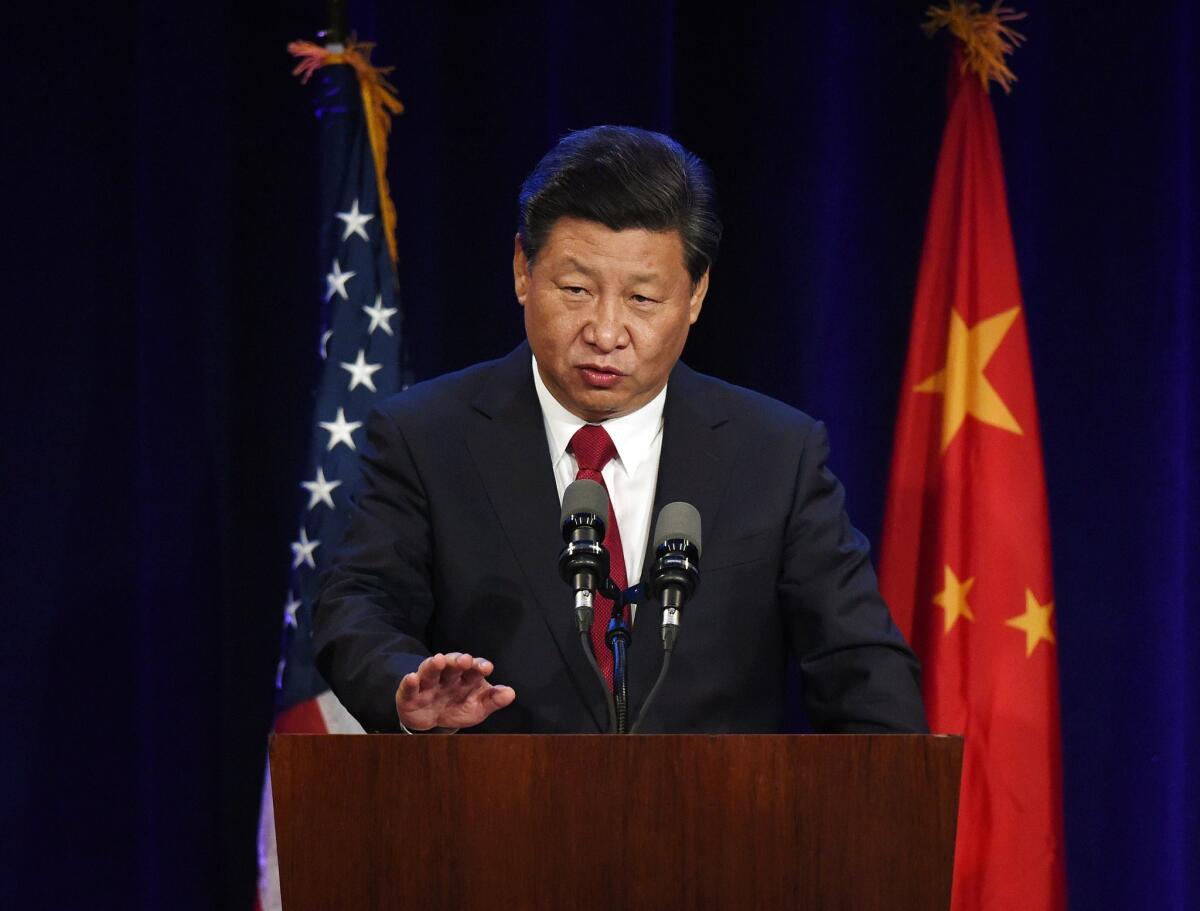Chinese president emphasizes cybersecurity during Seattle visit

Chinese President Xi Jinping speaks during his welcoming banquet in Seattle at the start of his visit to the U.S.
- Share via
Reporting from Seattle — In a policy address peppered with Hollywood allusions and assurances of China’s economic health, President Xi Jinping pledged Tuesday that his country would protect the rights of foreign investors and vowed that the nation would “never close its open door to the world.”
Xi kicked off his first state visit to the U.S. with a rare speech to an American audience, a gathering of business executives in Washington state, a regular haunt of Chinese leaders and his country’s No. 1 trading partner among the 50 states.
Emphasizing the importance of technology to his country and and his visit, Xi was joined at the head table by Bill and Melinda Gates, Microsoft Chief Executive Satya Nadella, Qualcomm head Steve Mollenkopf and Lu Wei, China’s cyberspace czar.
On the key issue of cyberattacks, Xi called his country “a strong defender of cybersecurity” and “a victim of hacking.” And he said China wanted to start “a high-level joint dialogue mechanism with the United States on fighting cybercrimes.”
“The Chinese government will not engage in commercial theft or encourage or support such theft by anyone,” Xi told the packed ballroom at an evening banquet at the Westin hotel in Seattle. “Commercial cybertheft and hacking against government networks are crimes that must be punished in accordance with the law and relevant international treaties.”
In the weeks leading up to Xi’s visit to Seattle, Washington, D.C., and New York, the Obama administration was working on possible sanctions against Chinese individuals and businesses believed to have hacked into U.S. business and government databases.
Although 11th-hour discussions prevented sanctions before Xi arrived in the U.S., deputy national security advisor Ben Rhodes reiterated the White House position that sanctions were still a possibility.
“We made very clear to China our deep concerns about certain cyberactivities,” Rhodes told reporters during a conference call Tuesday. “In particular, we focused on a Chinese government-sponsored, cyber-enabled theft of confidential business information and proprietary technology from U.S. companies.
“This is not just a matter of whether or not countries conduct traditional espionage,” Rhodes said. “It’s a matter of whether our businesses can have the confidence that they can operate in China or operate globally without being subjected to cyberintrusions and [attempts] to steal their intellectual property.”
Zachary Goldman, a former U.S. Treasury and Defense Department official, said that while there has been buzz that the U.S. and China might announce some mutually agreed-upon limits on conducting cyberattacks on each other’s crucial infrastructure, such a deal would not address the “fundamental underlying issues in the U.S.-China cyber-relationship” — industrial cyberespionage.
Such a deal “doesn’t begin to address a consistent complaint of high-level U.S. policymakers for several years, not to mention the business community, which is quite rightly disturbed at wholesale theft of [intellectual property],” said Goldman, who is executive director of NYU’s Center on Law and Security. “This is something the former director of the NSA has called … the ‘greatest transfer of wealth in history.’”
Xi offered no surprises in his speech, sticking to familiar talking points telegraphed long before his visit. He pledged that China would stick to its path of reforms to allow the market to play a greater role in the economy, and said China would not engage in a “currency war.”
He acknowledged that “recent abnormal ups and downs in China’s stock market have caused wide concern,” but he said gyrating Chinese stock markets had been stabilized by government intervention this summer.
It is the “duty of the government,” Xi said, to prevent “massive panic from happening,” and “China’s stock market has reached the phase of self-recovery and self-adjustment.”
Amid deepening rhetoric from Communist Party propaganda authorities on the need to resist “Western values,” Xi pledged that China would “never close its open door to the world.”
And to complaints that international companies were facing unfair policies and an uneven playing field in China, Xi said his government would protect the rights of foreigners investing in China and “treat all market players including foreign-invested companies fairly” — but didn’t offer any new specifics.
China has recently proposed new regulations on foreign nongovernmental organizations that would impose significant new requirements on them and possibly restrict a range of activities by educational institutions, civil society groups, environmental organizations and other entities.
Xi asserted Tuesday that China welcomed such foreign NGOs “so long as their activities are beneficial to the Chinese people.”
The Chinese leader, who rose to power in 2012 and has quickly consolidated control, emphasized that fighting corruption was a key task faced by his administration, and he pushed back against assertions that his widespread anti-graft campaign that has seen the ouster and punishment of tens of thousands of officials was a disguised effort to root out political enemies.
“This has nothing to do with power struggle,” he said. “In this case, there is no ‘House of Cards.’”
The mention of the Netflix series, which can be seen online in China, was just one Hollywood reference made by Xi; in his opening remarks he also tipped his hat to the film “Sleepless in Seattle.”
And in another attempt at a more folksy touch, he mentioned that he had traveled to Cuba, read Hemingway and even enjoyed a mojito at the writer’s favorite bar.
Times staff writers La Ganga reported from Seattle and Makinen from Beijing.
More to Read
Sign up for Essential California
The most important California stories and recommendations in your inbox every morning.
You may occasionally receive promotional content from the Los Angeles Times.















